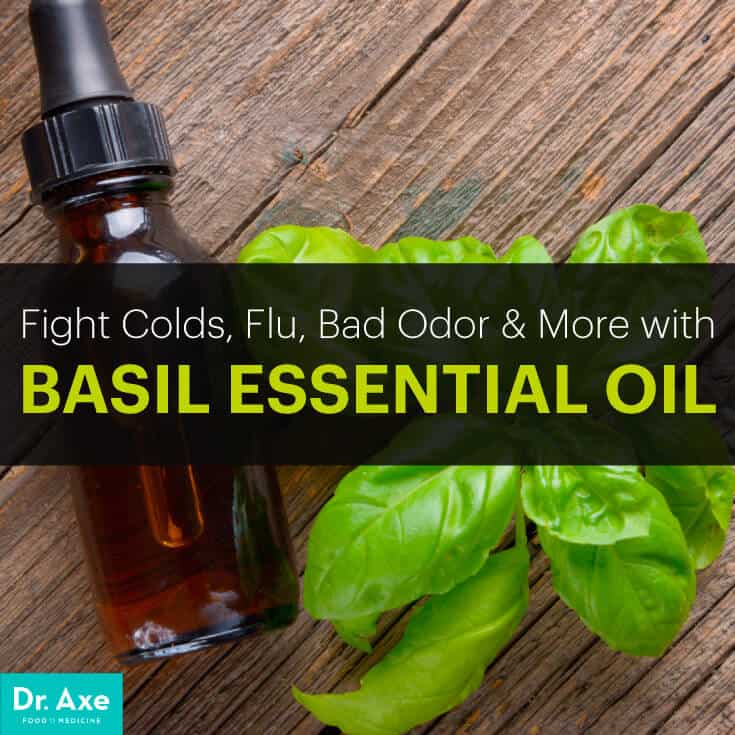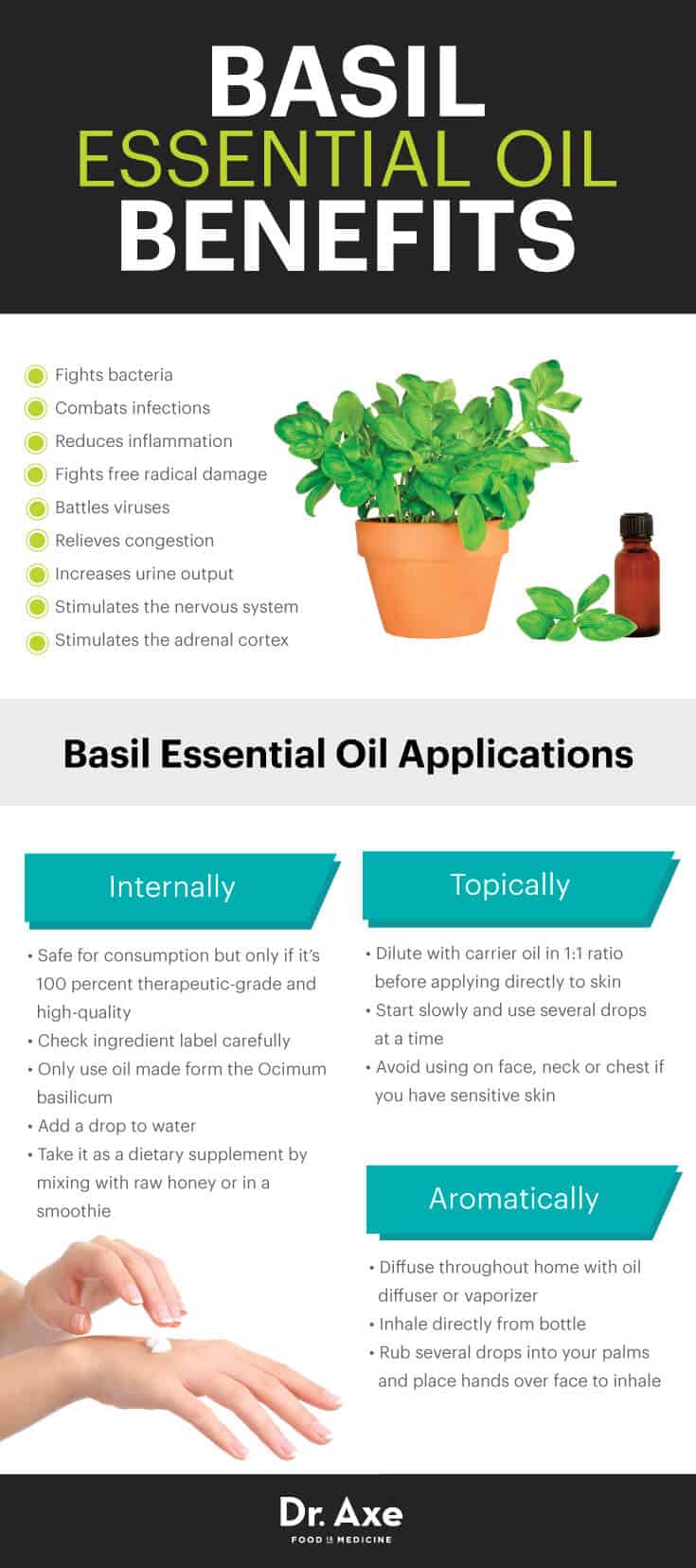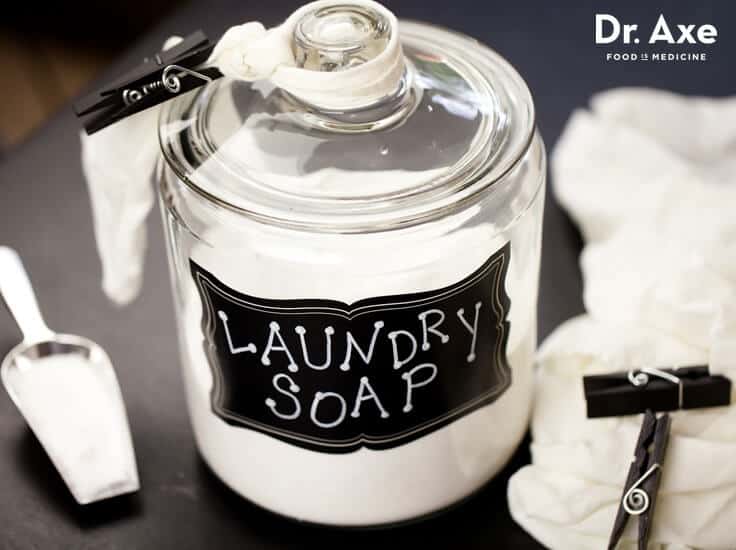Basil Essential Oil Fights Bacteria, Colds & Bad Odor

Basil essential oil, derived from the Ocimum basilicum plant, is commonly used to enhance the flavor of many recipes today. However, its uses extend far beyond the culinary world. Today, basil essential oil (sometimes called “sweet basil oil”) is used to heal various wounds and infections, and as a calming agent to combat inflammation, reduce adrenal fatigue, and treat nerve and muscle conditions.
As a natural anti-inflammatory, antiviral, antibiotic and diuretic, basil has been used in traditional Asian Indian medicine practices for years. In the 16th century, the leaves were used to treat migraines and chest infections. And centuries ago, Italian women wore basil to attract possible suitors.
Benefits of Basil Essential Oil
Ocimum basilicum L. (sweet basil) belongs to the Lamiaceae plant family, which includes about 200 species of various basil botanical varieties and forms grown around the world! With a naturally sweet, warm, spicy and herbal smell, basil oil can be used in multiple ways both internally and topically.
Basil essential oil benefits include:
- Fighting bacteria
- Fighting infections
- Reducing disease-causing inflammation
- Fighting free radical damage
- Fighting viruses
- Relieving congestion
- Increasing urine output
- Stimulating the nervous system
- Stimulating the adrenal cortex
While fresh basil herbs are also beneficial and a great way to flavor recipes, basil essential oil is much more concentrated and potent. The compounds found in basil oil are steam-distilled from fresh basil leaves, stems and flowers to form an extract that contains high levels of antioxidants and other beneficial phytochemicals.
The result is an effective and completely natural formula that helps treat cardiovascular, muscular, emotional and immune-related conditions. The aromatic character of each type of basil is determined by the plant’s exact genotype and major chemical compounds. Basil essential oil (from sweet basil) primarily consists of monoterpenes and phenylpropanoids. Of the 25 different active constituents found in basil essential oil that compromise 98.6 percent of the total oil, the most prominent include methyl eugenol (39.3 percent) and methyl chavicol (38.3 percent).
According to a 2014 review published by the Department of Phytochemistry at the Indian Council of Medical Research, basil oil has been effectively used as a traditional medicinal plant for the treatment of headaches, coughs, diarrhea, constipation, warts, worms, kidney malfunctions and more. The benefits of basil also include the ability to fight bacteria and odors in foods and on skin, so basil oil can be found in foods, beverages, dental and oral products, and fragrances.
Basil oil and holy basil oil (also called tulsi) are different in terms of chemical composition, although they do have some uses in common. Just like sweet basil, holy basil helps fight bacteria, fatigue, inflammation and infections.
14 Basil Essential Oil Uses
1. Antibacterial and Antifungal
Basil oil has shown antimicrobial activity against a wide range of foodborne bacteria, yeasts and mold. When researchers evaluated the effects of basil oil against six forms of bacteria and three strains of fungi, they found positive inhibition of all strains. You can use basil oil in your home to remove bacteria from kitchens and bathrooms, prevent contamination, and purify the air. Try diffusing or vaporizing basil oil or combining it with water in a spray bottle to rub down surfaces in your home.
2. Cold and Flu Treatment
Since it helps detoxify the body of bacteria and viruses, while fighting inflammation, pain and fatigue, use basil oil when you feeling sick. Diffuse the oil throughout your home, add a one to two drops to a steam bath, or make a homemade vapor rub using eucalyptus oil and basil oil that can massaged into the chest to open up your nasal passages. It makes for a great natural cold remedy.
3. Air Freshener
Bail is capable of eliminating odor-causing bacteria and mold from your home, car, appliances and furniture. In fact, the word basil is derived from the Greek sentence that means “to smell.” Traditionally in India, it’s been used for many culinary applications, including to eliminate odors and clean kitchen equipment. Run several drops through your kitchen appliances; combine it with baking soda to remove stains and bacteria from pots or pans; or spray it inside your toilet, shower and garbage cans.
4. Flavor Enhancer
Basil oil can infuse plenty of recipes with its signature aroma and flavor. Add one to two drops to juices, smoothies, sauces or dressings in place of using fresh torn basil. In the process, you’ll make your kitchen smell great and reduce the risk for food contamination, too!
5. Muscle Relaxant
Useful for healing fatigued or aching muscles, you can rub a few drops of basil essential oil along with coconut into painful, swollen muscles or joints. To further help relax tense areas and feel immediate relief, try soaking in a warm bath with Epsom salts,lavender oil and basil oil.
6. Ear Infection Remedy
Basil oil has been used in Ayurvedic medicine for centuries as a natural ear infection remedy. Rubbing a combination of frankincense, coconut and basil essential oil behind the ears and at the bottoms of the feet can speed up the time it takes to recover from ear infections while also reducing pain and swelling.
7. Homemade Toothpaste or Mouthwash
To remove bacteria and odor from your mouth, add several drops of pure basil oil to your mouthwash or toothpaste. This also helps protect your teeth and gums from toothaches, ulcers, sores and viral blisters.
8. Energizer and Mood Enhancer
Inhaling basil can help restore mental alertness and fight fatigue since it’s naturally a stimulant that works on the nervous system and adrenal cortex. It’s beneficial for reducing symptoms like sluggishness, brain fog, sore muscles and poor moods that come along with adrenal fatigue or chronic fatigue. Diffuse basil essential oil throughout your home or inhale it directly from the bottle to naturally heal adrenal fatigue. You can dab several drops on your wrists, chest and back for an instant pick-me-up.
9. Insect Repellent
Similarly to other essential oils, including citronella oil and thyme oil, the volatile oils found in basil can repel mosquitoes and prevent bug bites. To make a homemade bug spray or lotion, dilute several drops of basil essential oils with carrier oil and massage into skin or swollen bites as needed.
10. Treatment for Urinary Tract Infections
Because basil oil is an antibacterial, antiviral and disinfectant, it helps detoxify the urinary and digestive tracts and can speed up the healing process for painful infections. That makes it an effective home remedy for bladder infections and UTIs.
11. Acne Remedy
Because skin breakouts are mainly caused by built-up bacteria, excess oil and small areas of infections, basil oil can act like a home remedy for acne. Using a clean cotton ball, apply one to two drops of basil oil along with coconut or jojoba oil to the affected area once or twice daily.
12. Digestive Booster
As a diuretic, basil oil helps increase production of urine, which can reduce water retention, uncomfortable bloating and digestive issues. It’s also an effective antispasmodic and can reduce cramps associated with illness, food sensitives causing stomach issues or PMS. Other people find it useful for helping to naturally relieve constipation, nausea and motion sickness. Pure basil oil can be taken internally by adding one to two drops to warm water or tea, or you can inhale it and massage it directly into painful areas such as the abdomen and lower back.
13. Stress-Fighter
Basil oil is known to be uplifting and renewing, which makes it useful for lowering symptoms of anxiety, fear or nervousness. Used for aromatherapy for centuries to help people deal with racing thoughts and overwhelming feelings, you can burn basil oil at home to relax and unwind. This can also work quickly for natural headache relief.Massage one or two drops with a carrier oil into your feet or over your adrenals nightly.
14. Hair Shine Treatment
To strip away excess grease or buildup on your hair while adding shine, add a drop or two of basil oil to your shampoo. You can also try mixing it with baking soda and apple cider vinegar to remove bacteria, grease and residue from hair naturally.
Basil Essential Oil Research and Studies
Basil is considered a sacred plant in India, since basil essential oil is an amazing source of antioxidants, antibacterial agents and anti-inflammatory compounds. Among the protective phytochemicals found in basil’s volatile oils are constituents called terpinolene (7.7 percent), eugenol (4.5 percent) and cubenol (1.9 percent). On the basis of analyses of multiple different isolated basil oils, researchers have classified four major essential oil chemotypes of basil that are responsible for most of its health-promoting activities: (1) methyl chavicol-rich, (2) linalool-rich, (3) methyl eugenol-rich, (4) methyl cinnamate-rich and also numerous other subtypes.
Research shows that basil oil is capable of strongly inhibiting drug-resistant bacteria and various forms of fungi capable of causing infections. A study published in theInternational Journal of Antimicrobial Agents found that basil oil, along with other plant oils including anise and fennel, demonstrates inhibitory properties against powerful strains of bacteria, including Listeria monocytogenes and Salmonella enteriditis. Basil oil contains benzoic acid and methyl-paraben that are naturally able to fight harmful microorganisms and stop their growth and spreading. S. enteriditis was found to be particularly sensitive to inhibition by a combination of anise, fennel and basil oils.
As a common seasoning agent in foods and beverages for many centuries, research shows that basil actually offers protection against foodborne illnesses in addition to just making recipes taste better. A 2001 report published in The Journal of Food Protectionstated that basil oil was effective at controlling growth and survival of multiple dangerous microorganisms found within contaminated foods.
Among different plant essential oils tested, including fennel oil, oregano, parsley and cardamom, inhibition of growth of bacteria from basil oil was one of the most dramatic observed. Basil helped destroy high percentages of strains including Listeria monocytogenes, Staphylococcus aureus, E. coli, Lactobacillus and others that have the potential to cause serious, even deadly, infections in humans.
Basil essential oil also has demonstrated antioxidant effects that have been shown to fight chronic infections, including bronchitis and respiratory illnesses. When mixed with other plant oils, including fir, eucalyptus and rosemary oil, basil helps stop infections of the lungs and respiratory tract that can lead to coughs, swelling and pain. Because of its strong antioxidant and anti-inflammatory activities, basil oil can likely also benefit heart health, cognitive function and even reduce cancerous cell formation.
Basil Essential Oil Recipes
Here’s how you can start using basil essential oil at home:
- Aromatically: Basil essential oil can be diffused throughout your home using an oil diffuser or vaporizer. You can also inhale it directly from the bottle or rub several drops into your palms and then place your hands over your face to inhale.
- Topically: Basil oil should be diluted with a carrier oil like coconut oil in a 1:1 ratio before applying to directly to your skin. Since it’s a potent oil, start very slowly and use several drops at a time. Basil oil can sometimes cause skin reactions to people with sensitive skin, so avoid using it on your face, neck or chest before making sure you react positively.
- Internally: The FDA recognizes pure basil oil as safe for consumption (by21CFR182.20), but this is ONLY the case when using 100 percent therapeutic-grade, high-quality oil brands. Purchase your oil from a reputable seller and check the ingredient label carefully. You should only look for an oil that is made from theOcimum basilicum. You can add a drop to water or take it as a dietary supplement by mixing it with raw honey or into a smoothie.

Basil oil blends well with many other essential oils, including bergamot oil, black pepper oil, cedarwood oil, fennel oil, ginger oil, geranium oil, grapefruit oil, lavender oil, lemon oil, marjoram oil and neroli oil.
For its cleansing and protective qualities, try these simple homemade recipes below using basil oil, or refer to my Essential Oils Guide for many more ideas.
Homemade Laundry Soap Recipe
Doing the laundry can be expensive, especially for families! Laundry soap can not only be high-priced, but also contain toxic chemicals. Next time instead of buying your soap, try this homemade laundry soap recipe, which is antibacterial, deodorizing, cost-effective and easy to make.
Total Time: 5 minutes
Serves: 12–15
INGREDIENTS:
- 1 bar of grated Castile soap bar
- 2 cups Borax
- 2 cups washing soda
- 1 cup baking soda
- 10 drops basil essential oil
- 5 drops lavender essential oil
- 15 drops peppermint essential oil
DIRECTIONS:
Combine all ingredients and store in an air-tight container.

Interactions and Side Effects of Basil Essential Oil
Basil essential oil should be avoided during pregnancy since it can have an impact on hormonal levels and muscle or nerve functioning. It’s also not appropriate for anyone with epilepsy.
As with all essential oils, especially those that are new to you, always test for skin sensitivity prior to using them on sensitive or widespread areas. Do a skin patch test first on your feet or forearm to make sure you don’t experience irritation like redness, burning, hives or allergic reactions. Also keep basil oil away from your eyes and the insides of your ears or nose.
Comments
Post a Comment